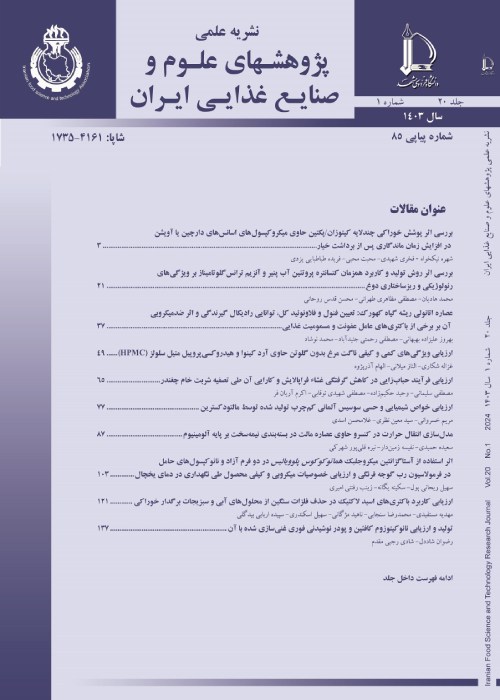The effect of aqueous extract of white tea on heat resistance of sesame oil prepared by cold pressing
White tea is a new ingredient in a wide range of phenolic, antioxidant and antimicrobial compounds. The most important catechins in white tea are epicatechin, epigallocatechin, epicatechin- 3- galate, and epigallocatechin- 3- galate, which are flavonol gallates. The concentration of these phenolic compounds in white tea is higher than green tea. Sesame seed oil, which is produced by cold pressing method, has a great ability to preserve antioxidant compounds. Significant oxidative stability of sesame oil is due to the presence of lignan non-soapy substances. Strong antioxidant compounds in sesame seed oil include sesamol, sesamulin (antioxidant precursor), sesaminol and its isomers. The aim of this study was to investigate the effect of natural antioxidants of sesame oil and white tea on inhibiting the effect of metals on oxidation of sesame oil.
In this study, aqueous extract of white tea was extracted and sesame oil was produced using cold press. In the next step, six samples including control sample (sesame oil), sesame oil containing white tea extract, sesame oil containing white tea extract and 0.1 ppm iron, Sesame oil containing white tea extract and 0.1 ppm copper, sesame oil with tea and 0.1 ppm zinc extract and sesame oil containing 100 ppm BHT were prepared. In all samples, aqueous extract of white tea in the amount of 6 mg/ 10 g was added to sesame oil. Total phenol, antioxidant capacity, power reducing on white tea extract and antioxidant power, peroxide number, oxidation stability and fatty acids profile were measured. All experiments were performed in a completely randomized design with three replications and the means were compared with Duncan’s test at the level of (P<0.05). SAS V 9.1 software was used for statistical analysis of quantitative data.
The results showed that the aqueous extract of white tea contained 4.06 (mg gallic acid per gram of sample) total phenol, 6.00 (μg/ ml) antioxidant capacity 0.020 (mg/ g). Ml) is a reducing power. The reducing power of BHT antioxidant was 40 times and the antioxidant power of BHT was 14.85 times more than the aqueous extract of white tea. In the inhibition of free radicals in sesame oil, the aqueous extract of white tea had a significantly greater effect than the control sample. The iron- containing sample had more oxidation than other samples. In the inhibition of free radicals in sesame oil, the aqueous extract of white tea had a significantly greater effect than the control sample. The iron- containing sample had more oxidation than other samples. Rancimat value for samples of control sesame oil, sesame oil with tea and iron extract, sesame oil with tea and copper extract, sesame oil with tea and zinc extract, sesame oil with tea extract and sesame oil with synthetic antuioxidant BHT respectively 8.79 4.80, 9.08, 9.35, 9.42 and 9.61 hours were measured. The highest stability was related to the sample of sesame oil and synthetic antioxidant BHT and the Results and Discussion The results showed that the aqueous extract of white tea contained 4.06 (mg gallic acid per gram of sample) total phenol, 6.00 (μg/ ml) antioxidant capacity 0.020 (mg/ g). Ml) is a reducing power. The reducing power of BHT antioxidant was 40 times and the antioxidant power of BHT was 14.85 times more than the aqueous extract of white tea. In the inhibition of free radicals in sesame oil, the aqueous extract of white tea had a significantly greater effect than the control sample. The iron- containing sample had more oxidation than other samples. In the inhibition of free radicals in sesame oil, the aqueous extract of white tea had a significantly greater effect than the control sample. The iron- containing sample had more oxidation than other samples. Rancimat value for samples of control sesame oil, sesame oil with tea and iron extract, sesame oil with tea and copper extract, sesame oil with tea and zinc extract, sesame oil with tea extract and sesame oil with synthetic antuioxidant BHT respectively 8.79 4.80, 9.08, 9.35, 9.42 and 9.61 hours were measured. The highest stability was related to the sample of sesame oil and synthetic antioxidant BHT and the lowest stability was related to the sample of sesame oil with tea and iron extracts. In comparison with the effect of metals on the oxidation of sesame oil, the addition of iron to sesame oil has increased the oxidation rate compared to the two other examined metals (copper and zinc). Rare metals increase the oxidation rate of edible oils by increasing the production of free radicals from fatty acids or hydroperoxides. The composition of of fatty acids profile showed that palmitic acid, stearic acid, oleic acid, linoleic acid and linolenic acid were the predominant fatty acids in sesame oil. In the iron- containing sample, with increasing oxidation rate, the amount of linolenic acid decreased compared to other samples. The results of the Se index were confirmatory on the results of oxidative stability index. White tea extract and sesame oil due to their antioxidant and phenolic compounds have been able to inhibit free radicals and metal peroxidants, especially copper and zinc. Sesame oil extracted by cold pressing is not suitable for frying due to its low heat resistance, but it can be used in the formulation of salad dressings.
- حق عضویت دریافتی صرف حمایت از نشریات عضو و نگهداری، تکمیل و توسعه مگیران میشود.
- پرداخت حق اشتراک و دانلود مقالات اجازه بازنشر آن در سایر رسانههای چاپی و دیجیتال را به کاربر نمیدهد.


